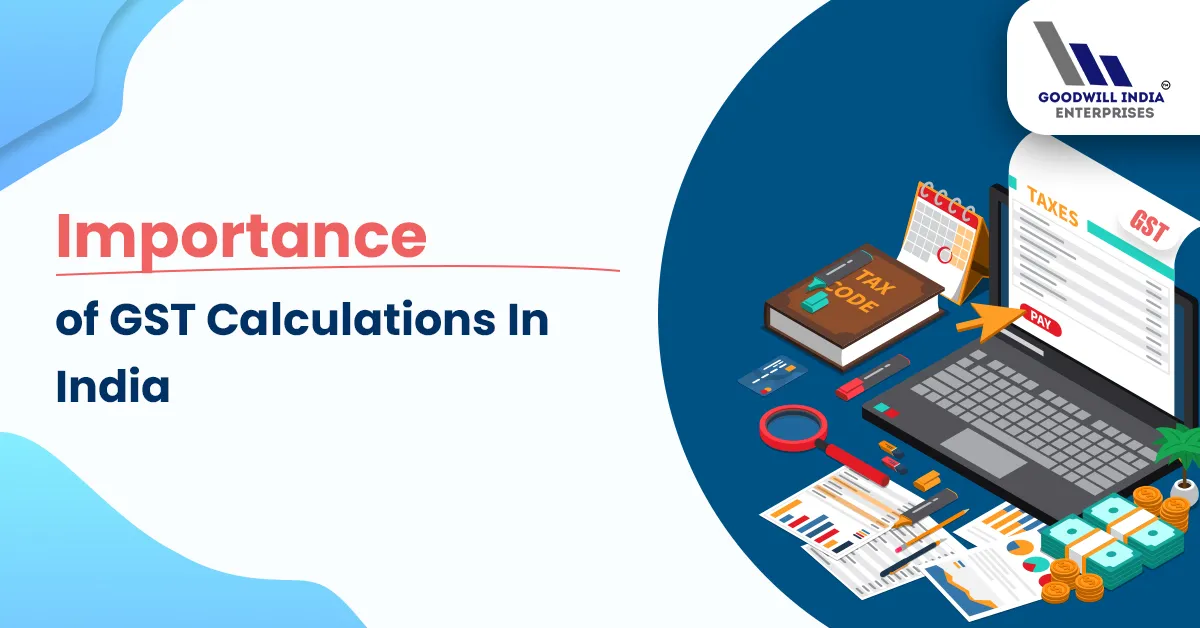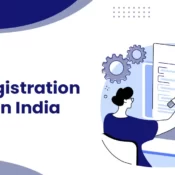
Importance of GST Calculations In India
Goods and Services Tax was introduced in India in the year 2017 as a comprehensive tax that is levied on the supply of goods and services. The introduction of GST has simplified the tax system in India by replacing multiple indirect taxes such as excise duty, service tax, and value-added tax (VAT) with a single tax regime.
If you are a business owner in India, it is essential to know how to calculate GST to avoid any legal or financial issues. In this blog post, we will discuss the process of calculating GST in India.
GST Registration
Before we get into the calculation process, let's discuss GST registration online in Chennai. All businesses with annual turnover of Rs. 20 lakhs or more has to register for GST. In some states, the threshold limit is Rs. 10 lakhs. If you are running a business in Chennai and need help with GST registration in Chennai, you can contact auditing firms or accounting firms in Chennai like Goodwill Filings.
GST registration in Chennai can be done online through the GST portal. You need to provide details such as your PAN, business registration documents, bank account details, and contact information. After submitting the application, you will receive a GST identification number (GSTIN) within a few days.
Calculating GST
The GST calculation process involves determining the GST rate applicable to your goods or services and applying it to the taxable value. The taxable value is the value of goods or services after deducting any discounts, taxes, or other charges.
There are four different GST rates in India: 5%, 12%, 18%, and 28%. Some goods and services are exempted from GST, such as healthcare services, educational services, and essential commodities like fresh fruits and vegetables.
|
GST Tax Slab |
Goods and Services |
|
No Tax |
Goods – Goods such as stone, marble, or wooden deities, raw materials utilized in brooms, salt, eggs, whole food materials, newspapers, sanitary napkins, picture books and coloring books for children, and Rakhis lacking precious metals like gold or silver, are exempt from taxation. Additionally, no taxes will be charged on statues of deities made of stone. Services – Hotels and lodges with a tariff below INR 1,000 are excluded from GST taxes. Additionally, the list of exempted services covers IMM courses and bank charges on savings accounts. |
|
5% |
Goods – Edible oil, spices, bread, chapati, tea, coffee and much more. Additionally, baby food, sugar, nuts, sweets, vegetables, non-branded namkeen, atta chakki, coal, biogas, fertilizers, life-saving medicines and drugs, and incense sticks (agarbatti). Services – Leasing of aircraft, crude oil and petroleum transportation, economy-class flight tickets, tailoring, paper printing, AC cabs and taxis, and AC and non-AC restaurants with a turnover of INR 50 lakhs or less. |
|
12% |
Goods – Frozen meat, meat sausages, juices, sauces (excluding salad dressing), cakes, pickles, boiled sugar, and milk-based products such as Ghee, Butter, and Cheese. Drinking water and coconut water are also included in the list. Services – Movie tickets, flight tickets business class, hotel less than INR 7,500, and food outlets without a liquor license. |
|
18% |
Goods – Mineral water, raw pasta, biscuits, pastries, soup, cornflakes, curry powder and paste, preserved vegetables, food mixes, supplements and condiments, refined sugar, Cocoa butter, Ice cream, chocolate and chewing gum. Services – Movie tickets priced above INR 100, hotel accommodations with a tariff of INR 7,500 or higher, daily room rentals ranging from INR 2,500 to 5,000, restaurants in hotels with a daily tariff of over INR 7,500, telecom and other IT services, as well as catering services. |
|
28% |
Goods – Aerated water (with or without added sugar), instant coffee, chocolates without cocoa content, protein, coffee and custard concentrates, molasses, and sugar syrup. Services – Hotel more than INR 7,500, go-kart, gambling, casinos, theme parks, amusement parks and much more. |
Let's take an example to understand the GST calculation process.
Suppose you are a manufacturer of mobile phones in Chennai, and you sell a phone for Rs. 10,000 to a customer. The GST rate applicable to mobile phones is 18%. Therefore, the GST amount would be:
GST amount = (18/100) * 10,000 = Rs. 1,800
The total amount payable by customer would be Rs. 11,800 (Rs. 10,000 + Rs. 1,800).
GST Input Tax Credit
One of the benefits of GST is the input tax credit (ITC) mechanism. It allows businesses to claim credit for the GST paid on inputs used in the production or supply of goods and services. For example, you purchase raw materials worth Rs. 5,000 and pay Rs. 900 as GST, you can claim the GST as input tax credit.
To claim input tax credit, you need to ensure that the supplier has filed their GST returns and the details of the purchase are correctly mentioned in your GST returns. If you fail to claim input tax credit, you may end up paying more GST than required.
Conclusion
Calculating GST in India involves determining the GST rate applicable to your goods or services and applying it to the taxable value. It is essential to ensure that you register for GST and file your GST returns on time to avoid any legal or financial issues. If you need help with GST registration or filing GST returns, you can contact auditing firms or accounting firms in Chennai. With the right knowledge and guidance, you can ensure that your business complies with the GST regulations in India.
For GST registration and to keep your GST filings up-to-date do contact Goodwill Filings – Chennai’s best GST registration and filing company.




